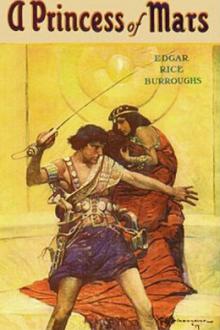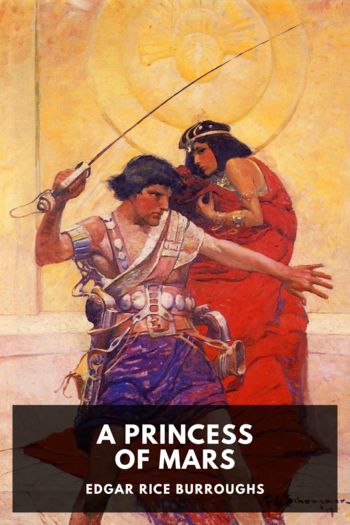A Princess of Mars - Edgar Rice Burroughs (the beginning after the end novel read TXT) 📗

- Author: Edgar Rice Burroughs
- Performer: 0812968514
Book online «A Princess of Mars - Edgar Rice Burroughs (the beginning after the end novel read TXT) 📗». Author Edgar Rice Burroughs
Dejah Thoris went aboard the flagship, and was much put out that I would not follow, but, as I explained to her, the battle was but partly won; we still had the land forces of the besieging Zodangans to account for, and I would not leave Tars Tarkas until that had been accomplished.
The commander of the naval forces of Helium promised to arrange to have the armies of Helium attack from the city in conjunction with our land attack, and so the vessels separated and Dejah Thoris was borne in triumph back to the court of her grandfather, Tardos Mors, Jeddak of Helium.
In the distance lay our fleet of transports, with the thoats of the green warriors, where they had remained during the battle. Without landing stages it was to be a difficult matter to unload these beasts upon the open plain, but there was nothing else for it, and so we put out for a point about ten miles from the city and began the task.
It was necessary to lower the animals to the ground in slings and this work occupied the remainder of the day and half the night. Twice we were attacked by parties of Zodangan cavalry, but with little loss, however, and after darkness shut down they withdrew.
As soon as the last thoat was unloaded Tars Tarkas gave the command to advance, and in three parties we crept upon the Zodangan camp from the north, the south and the east.
About a mile from the main camp we encountered their outposts and, as had been prearranged, accepted this as the signal to charge. With wild, ferocious cries and amidst the nasty squealing of battle-enraged thoats we bore down upon the Zodangans.
We did not catch them napping, but found a well-entrenched battle line confronting us. Time after time we were repulsed until, toward noon, I began to fear for the result of the battle.
The Zodangans numbered nearly a million fighting men, gathered from pole to pole, wherever stretched their ribbon-like waterways, while pitted against them were less than a hundred thousand green warriors. The forces from Helium had not arrived, nor could we receive any word from them.
Just at noon we heard heavy firing all along the line between the Zodangans and the cities, and we knew then that our much-needed reinforcements had come.
Again Tars Tarkas ordered the charge, and once more the mighty thoats bore their terrible riders against the ramparts of the enemy. At the same moment the battle line of Helium surged over the opposite breastworks of the Zodangans and in another moment they were being crushed as between two millstones. Nobly they fought, but in vain.
The plain before the city became a veritable shambles ere the last Zodangan surrendered, but finally the carnage ceased, the prisoners were marched back to Helium, and we entered the greater city’s gates, a huge triumphal procession of conquering heroes.
The broad avenues were lined with women and children, among which were the few men whose duties necessitated that they remain within the city during the battle. We were greeted with an endless round of applause and showered with ornaments of gold, platinum, silver, and precious jewels. The city had gone mad with joy.
My fierce Tharks caused the wildest excitement and enthusiasm. Never before had an armed body of green warriors entered the gates of Helium, and that they came now as friends and allies filled the red men with rejoicing.
That my poor services to Dejah Thoris had become known to the Heliumites was evidenced by the loud crying of my name, and by the loads of ornaments that were fastened upon me and my huge thoat as we passed up the avenues to the palace, for even in the face of the ferocious appearance of Woola the populace pressed close about me.
As we approached this magnificent pile we were met by a party of officers who greeted us warmly and requested that Tars Tarkas and his jeds with the jeddaks and jeds of his wild allies, together with myself, dismount and accompany them to receive from Tardos Mors an expression of his gratitude for our services.
At the top of the great steps leading up to the main portals of the palace stood the royal party, and as we reached the lower steps one of their number descended to meet us.
He was an almost perfect specimen of manhood; tall, straight as an arrow, superbly muscled and with the carriage and bearing of a ruler of men. I did not need to be told that he was Tardos Mors, Jeddak of Helium.
The first member of our party he met was Tars Tarkas and his first words sealed forever the new friendship between the races.
“That Tardos Mors,” he said, earnestly, “may meet the greatest living warrior of Barsoom is a priceless honor, but that he may lay his hand on the shoulder of a friend and ally is a far greater boon.”
“Jeddak of Helium,” returned Tars Tarkas, “it has remained for a man of another world to teach the green warriors of Barsoom the meaning of friendship; to him we owe the fact that the hordes of Thark can understand you; that they can appreciate and reciprocate the sentiments so graciously expressed.”
Tardos Mors then greeted each of the green jeddaks and jeds, and to each spoke words of friendship and appreciation.
As he approached me he laid both hands upon my shoulders.
“Welcome, my son,” he said; “that you are granted, gladly, and without one word of opposition, the most precious jewel in all Helium, yes, on all Barsoom, is sufficient earnest of my esteem.”
We were then presented to Mors Kajak, Jed of lesser Helium, and father of Dejah Thoris. He had followed close behind Tardos Mors and seemed even more affected by the meeting than had his father.
He tried a dozen times to express his gratitude to me, but his voice choked with emotion and he could not speak, and yet he had, as I was to later learn, a reputation for ferocity and fearlessness as a fighter that was remarkable even upon warlike Barsoom. In common with all Helium he worshiped his daughter, nor could he think of what she had escaped without deep emotion.
For ten days the hordes of Thark and their wild allies were feasted and entertained, and, then, loaded with costly presents and escorted by ten thousand soldiers of Helium commanded by Mors Kajak, they started on the return journey to their own lands. The jed of lesser Helium with a small party of nobles accompanied them all the way to Thark to cement more closely the new bonds of peace and friendship.
Sola also accompanied Tars Tarkas, her father, who before all his chieftains had acknowledged her as his daughter.
Three weeks later, Mors Kajak and his officers, accompanied by Tars Tarkas and Sola, returned upon a battleship that had been dispatched to Thark to fetch them in time for the ceremony which made Dejah Thoris and John Carter one.
For nine years I served in the councils and fought in the armies of Helium as a prince of the house of Tardos Mors. The people seemed never to tire of heaping honors upon me, and no day passed that did not bring some new proof of their love for my princess, the incomparable Dejah Thoris.
In a golden incubator upon the roof of our palace lay a snow-white egg. For nearly five years ten soldiers of the jeddak’s Guard had constantly stood over it, and not a day passed when I was in the city that Dejah Thoris and I did not stand hand in hand before our little shrine planning for the future, when the delicate shell should break.
Vivid in my memory is the picture of the last night as we sat there talking in low tones of the strange romance which had woven our lives together and of this wonder which was coming to augment our happiness and fulfill our hopes.
In the distance we saw the bright-white light of an approaching airship, but we attached no special significance to so common a sight. Like a bolt of lightning it raced toward Helium until its very speed bespoke the unusual.
Flashing the signals which proclaimed it a dispatch bearer for the jeddak, it circled impatiently awaiting the tardy patrol boat which must convoy it to the palace docks.
Ten minutes after it touched at the palace a message called me to the council chamber, which I found filling with the members of that body.
On the raised platform of the throne was Tardos Mors, pacing back and forth with tense-drawn face. When all were in their seats he turned toward us.
“This morning,” he said, “word reached the several governments of Barsoom that the keeper of the atmosphere plant had made no wireless report for two days, nor had almost ceaseless calls upon him from a score of capitals elicited a sign of response.
“The ambassadors of the other nations asked us to take the matter in hand and hasten the assistant keeper to the plant. All day a thousand cruisers have been searching for him until just now one of them returns bearing his dead body, which was found in the pits beneath his house horribly mutilated by some assassin.
“I do not need to tell you what this means to Barsoom. It would take months to penetrate those mighty walls, in fact the work has already commenced, and there would be little to fear were the engine of the pumping plant to run as it should and as they all have for hundreds of years now; but the worst, we fear, has happened. The instruments show a rapidly decreasing air pressure on all parts of Barsoom—the engine has stopped.”
“My gentlemen,” he concluded, “we have at best three days to live.”
There was absolute silence for several minutes, and then a young noble arose, and with his drawn sword held high above his head addressed Tardos Mors.
“The men of Helium have prided themselves that they have ever shown Barsoom how a nation of red men should live, now is our opportunity to show them how they should die. Let us go about our duties as though a thousand useful years still lay before us.”
The chamber rang with applause and as there was nothing better to do than to allay the fears of the people by our example we went our ways with smiles upon our faces and sorrow gnawing at our hearts.
When I returned to my palace I found that the rumor already had reached Dejah Thoris, so I told her all that I had heard.
“We have been very happy, John Carter,” she said, “and I thank whatever fate overtakes us that it permits us to die together.”
The next two days brought no noticeable change in the supply of air, but on the morning of the third day breathing became difficult at the higher altitudes of the rooftops. The avenues and plazas of Helium were filled with people. All business had ceased. For the most part the people looked bravely into the face of their unalterable doom. Here and there, however, men and women gave way to quiet grief.
Toward the middle of the day many of the weaker commenced to succumb and within an hour the people of Barsoom were sinking by thousands into the unconsciousness which precedes death by asphyxiation.
Dejah Thoris and I with





Comments (0)